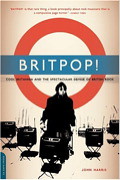Britpop revisited

I've been meaning to talk about Britpop! Cool Britannia and the Spectacular Demise of English Rock since I finished it a couple weeks ago, but last week's Salon article on Tony Blair and Chris Martin finally reminded me. The author of the latter, Brendan O’Neill, makes a pretty convincing case that "Martin is the rock star Blair once dreamt of becoming, and Blair is the kind of middle-aged man Martin is destined to become." Good stuff. (Though not, perhaps, if you have to endure Coldplay’s music or Blair’s leadership.)
Britpop documents an earlier period of political/musical collaboration—roughly 1994 to 1997—when the two biggest bands in Britain, Oasis and Blur, enjoyed drinks at 10 Downing Street when they weren’t slagging one another in the music press. To Americans, of course, the idea that a rock band would enjoy such access to a country’s leader is unimaginable. We’ve never taken "culture," commercially sanctioned, let alone underground, that seriously. Just witness the hysterical reaction to artists who've dared speak out against the Iraq war. Which makes candidate Blair's desperation to gain the public approval of the likes of Noel Gallagher and Damon Albarn pretty bizarre. And the international branding of "Cool Britannia" rather sad and cynical.
But politics is actually a small part of Britpop. The book's also brimming with gossipy bits about Elastica's collective heroin habit, Brett Butler's (Suede) sexual ambiguity/insecurity and nervous breakdowns courtesy of Creation Records owner Alan McGee and Blur's Albarn. Most fascinating for me, however, is the contrast between what passed as "indie" in Britain in the 90s (serious thought going into hairstyles and clothing, battle-of-the-bands competitions) and what the American scene, consumed as it was (is) with authenticity, tolerated.
Perhaps the difference owes to the damnable class thing. For a lot of working class British rockers like the Gallagher brothers it's perfectly acceptable to make money off your work. Loyalty to an indie ideal is meaningless when your only other option is bricklaying. American indie rock, born and bred by college radio, was and is, a mainly middle/upper-middle class phenomenon. Look at the big names/scene leaders of the 90s—Stephen Malkmus, Ian MacKaye, Mac McCaughan, Liz Phair—all from comfortable, supportive backgrounds. (Not sure about folks like Calvin Johnson and Gerard Cosley, but I can guess.) And if you’ve grown up in that environment, the appearance of aspiration just isn’t the thing nor, need it be said, is it necessary.
So. The best moments of Britpop. Certainly not Oasis (though the Gallaghers, in various interviews, have provided us with some of the most fabulously witless quotes in rock history—and continue to do so on a daily basis). Ten years on, Pulp holds up as an admirable, even heroic band. And though Blur often shoots itself in the foot, artistically speaking, they nevertheless succeed despite themselves. How else to explain the very wonderful Tender—purveyor of that hoariest rock cliché, the gospel choir? If you hate this song, you don’t have a heart, simple as that.
From Different Class and 13 or Best of Blur.



2 Comments:
When XRT used to play "Tender"--right after 13 came out--I thought it was the latest greatest thing since sliced bread. I tried to get into other Blur stuff but it just wasn't for me. But I turn up the volume when "Tender" comes on the iTunes and hit repeat a few times when it ends. Great, great song.
Yeah, Blur's tricky. I personally don't like the real Anglocentric Madness-inspired stuff. But they can do a good pop song--the Madchester inspired There's No Other Way is one of my faves. And occasionally, they can do sprawling and sublime. Which is still a lot more than I can say for the vast majority of bands.
Post a Comment
<< Home